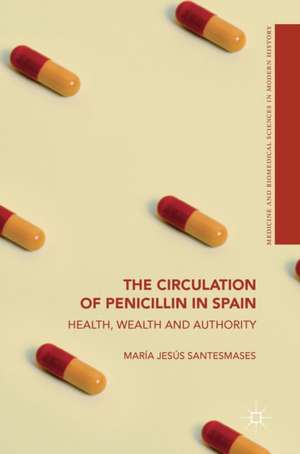The Circulation of Penicillin in Spain: Health, Wealth and Authority: Medicine and Biomedical Sciences in Modern History
Autor María Jesús Santesmasesen Limba Engleză Hardback – 2 feb 2018
| Toate formatele și edițiile | Preț | Express |
|---|---|---|
| Paperback (1) | 777.20 lei 6-8 săpt. | |
| Springer International Publishing – 4 iun 2019 | 777.20 lei 6-8 săpt. | |
| Hardback (1) | 786.04 lei 6-8 săpt. | |
| Springer International Publishing – 2 feb 2018 | 786.04 lei 6-8 săpt. |
Din seria Medicine and Biomedical Sciences in Modern History
- 20%
 Preț: 691.97 lei
Preț: 691.97 lei -
 Preț: 282.19 lei
Preț: 282.19 lei - 20%
 Preț: 691.09 lei
Preț: 691.09 lei - 18%
 Preț: 781.77 lei
Preț: 781.77 lei - 15%
 Preț: 650.69 lei
Preț: 650.69 lei - 15%
 Preț: 584.26 lei
Preț: 584.26 lei - 15%
 Preț: 645.14 lei
Preț: 645.14 lei - 18%
 Preț: 727.80 lei
Preț: 727.80 lei -
 Preț: 167.93 lei
Preț: 167.93 lei - 15%
 Preț: 650.37 lei
Preț: 650.37 lei -
 Preț: 231.67 lei
Preț: 231.67 lei - 15%
 Preț: 585.90 lei
Preț: 585.90 lei -
 Preț: 220.13 lei
Preț: 220.13 lei -
 Preț: 454.16 lei
Preț: 454.16 lei - 15%
 Preț: 585.40 lei
Preț: 585.40 lei - 18%
 Preț: 997.71 lei
Preț: 997.71 lei - 18%
 Preț: 785.11 lei
Preț: 785.11 lei - 18%
 Preț: 780.68 lei
Preț: 780.68 lei - 15%
 Preț: 643.00 lei
Preț: 643.00 lei - 18%
 Preț: 780.68 lei
Preț: 780.68 lei - 18%
 Preț: 900.94 lei
Preț: 900.94 lei - 18%
 Preț: 732.52 lei
Preț: 732.52 lei
Preț: 786.04 lei
Preț vechi: 958.59 lei
-18% Nou
Puncte Express: 1179
Preț estimativ în valută:
150.44€ • 156.45$ • 125.89£
150.44€ • 156.45$ • 125.89£
Carte tipărită la comandă
Livrare economică 14-28 martie
Preluare comenzi: 021 569.72.76
Specificații
ISBN-13: 9783319697178
ISBN-10: 331969717X
Pagini: 231
Ilustrații: XI, 239 p. 9 illus., 1 illus. in color.
Dimensiuni: 148 x 210 mm
Greutate: 0.56 kg
Ediția:1st ed. 2018
Editura: Springer International Publishing
Colecția Palgrave Macmillan
Seria Medicine and Biomedical Sciences in Modern History
Locul publicării:Cham, Switzerland
ISBN-10: 331969717X
Pagini: 231
Ilustrații: XI, 239 p. 9 illus., 1 illus. in color.
Dimensiuni: 148 x 210 mm
Greutate: 0.56 kg
Ediția:1st ed. 2018
Editura: Springer International Publishing
Colecția Palgrave Macmillan
Seria Medicine and Biomedical Sciences in Modern History
Locul publicării:Cham, Switzerland
Cuprins
1. Introduction: the West, Spain and the early circulation of penicillin.- 2. Fleming in Spain: the hero, the antimicrobial and the politics of public acclaim.- 3. Manufacturing penicillin: health, industry and gender.- 4. Smuggling: The management of scarcity and trade of penicillin as a post-war commodity.- 5. Modern Times: screening antibiotics and the factory line.- 6. A new promising drug: bacteria, antibiotics and marketing.- 7. Beyond healing: antibiotic resistance and regulatory regimes as agents in the Spanish transition to democracy.- 8. Penicillin in Spain, 1940s-1980s: Circulating health, research and gender.- 9. Final reflections.
Recenzii
“An important book that pushes the boundaries of the historiography of biomedicine in many ways, The Circulation of Penicillin in Spain is also an interesting read for beginners, thanks to comprehensive introductions to the twentieth-century history of Spain; the origins of industrial drug production; the genealogy of penicillin; the history of antibiotic development, screening, and resistance; the standardization of terminology; and European consumption and regulation policies.” (Agata Ignaciuk, Technology and Culture, Vol. 62 (2), April, 2021)
“Marıá Jesús Santesmases’s innovative new book, The Circulation of Penicillin in Spain, stands at the crossroads of two recent historiographies: science and technology under fascism, and the history of drugs. … Santesmases interweaves a story of biomedical politics and political economy with an on-the-ground exploration of gender and labor in the Spanish drug industry.” (Angela N. H. Creager, Journal of the History of Biology, August, 2018)
Notă biografică
María Jesús Santesmases is a Research Fellow in the Institute of Philosophy at the Consejo Superior de Investigaciones Científicas (CSIC), Madrid. She is a historian of biology and has published on the twentieth-century history of molecular biology and biochemistry, genetics, antibiotics and women scientists. She is co-editor with Teresa Ortiz-Gómez of Gendered Drugs and Medicine (2014), and with Edna Suárez of A Cell-Based Epistemology: New Historical Approaches to Human Genetics, a special issue of the journal, Historical Studies in the Natural Sciences (2015).
Textul de pe ultima copertă
This book reconstructs the early circulation of penicillin in Spain, a country exhausted by civil war (1936–1939), and oppressed by Franco’s dictatorship. Embedded in the post-war recovery, penicillin’s voyages through time and across geographies – professional, political and social – were both material and symbolic. This powerful antimicrobial captivated the imagination of the general public, medical practice, science and industry, creating high expectations among patients, who at times experienced little or no effect. Penicillin’s lack of efficacy against some microbes fueled the search for new wonder drugs and sustained a decades-long research agenda built on the post-war concept of development through scientific and technological achievements. This historical reconstruction of the social life of penicillin between the 1940s and 1980s – through the dictatorship to democratic transition – explores political, public, medical, experimental and gender issues, and the rise of antibiotic resistance.
Caracteristici
Provides an in-depth analysis of the history and circulation of penicillin in Spain Brings together scientific, medical, social, political and industrial histories Considers the circulation of penicillin and other antibiotics in terms of scientific exchange, industrial production and social perception Includes supplementary material: sn.pub/extras
